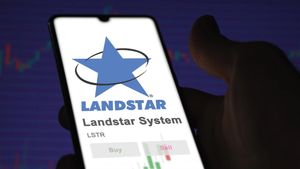Heyward Donigan Departs from the Company as President and CEO
Company Reaffirms Fiscal 2023 Financial Guidance
Rite Aid Corporation (NYSE: RAD) (“Rite Aid” or the “Company”) announced today that its Board of Directors has appointed Elizabeth (“Busy”) Burr, a member of the Company’s Board, as interim CEO, effective immediately. Burr’s appointment follows Heyward Donigan’s departure from the Company as President and CEO, and as a member of the Board. Rite Aid has initiated a search to identify a permanent CEO and has retained a leading executive search firm.
Burr has extensive experience in the health industry, and proven expertise in innovation, business strategy, retail and brand management. She previously served as Vice President, Head of Health Ventures and Chief Innovation Officer at Humana, a $70 billion for-profit U.S. health insurance company. Most recently, at Carrot Inc., named a “Most Innovative Company” by Fast Company magazine in 2020, Burr served as President and Chief Commercial Officer, leading the team focused on bringing the company’s digital health solutions to market. Burr previously served as Managing Director of Citi Ventures and Global Head of Business Incubation of Citigroup Inc. as well as Entrepreneur-in-Residence at eBay Inc. She has also held various senior leadership roles at Credit Suisse Group AG (formerly Credit Suisse First Boston) and Gap Inc., where she served as Vice President of Global Brand Management.
Bruce Bodaken, Rite Aid Chairman, stated, “As the Company continues its efforts to enhance its competitive position in this dynamic environment, the Board determined and Heyward agreed that now is the right time to identify the next leader of the business. With a deep understanding of the industry and our strategy, the Board was unanimous in its belief that Busy is highly qualified to serve as interim CEO while the Board conducts a search for a permanent successor. We are fortunate to have someone of her caliber to step into the role and are confident in Busy’s ability to lead the Company forward during this transition period.”
Burr said, “Having served as a Director since 2019, I have great respect for the important role Rite Aid plays as a full-service pharmacy improving health outcomes for millions of Americans. I will work with the Board and management team to realize our vast potential while supporting our thousands of pharmacists and team members who are focused every day on meeting the needs of our communities and customers. With Rite Aid’s well-established brand and its committed and talented team, I look forward to delivering on our business strategy and driving value for all our stakeholders.”
Bodaken continued, “On behalf of the entire Board, I want to thank Heyward for her contributions and service to Rite Aid, particularly her efforts in helping to lead Rite Aid throughout the Covid-19 pandemic. We wish her all the best in her future endeavors.”
Donigan said, “It has been a privilege to lead Rite Aid and its exceptional team. I am proud of all that we have achieved together, and I believe that the Company is well positioned for the future.”
Rite Aid reaffirms its fiscal year 2023 guidance for total revenues between $23.7 billion and $24.0 billion, net loss between $584 million and $551 million, Adjusted EBITDA between $410 million and $440 million and capital expenditures of approximately $225 million.
The Company continues to expect to generate positive free cash flow in Fiscal 2023 and will provide additional detail on its financials and operational progress when it reports its full fourth quarter and fiscal year 2023 results.
About Elizabeth “Busy” Burr
Busy Burr is the former President and Chief Commercial Officer at Carrot Inc., a digital health care company with solutions that combine behavioral science, clinical expertise, and proprietary technology, from 2019 through 2021. Prior to that, Burr served as the Chief Innovation Officer and Vice President of Healthcare Trend and Innovation at Humana where she was responsible for driving the design, build and adoption of new product platforms in digital health, provider experience, and telemedicine, to improve health outcomes, create superior member experiences, and improve health care costs. She also founded Humana’s strategic investing practice, Humana Health Ventures. Prior to joining Humana in 2015, Burr was managing director of Citi Ventures and led large-scale business transformation efforts as the global head of Citi’s Business Incubation Function-DesignWorks. Prior to this, she served as CMO and Global Head of Communications of the Global Technology Group at Credit Suisse First Boston. Earlier in her career, Burr spent seven years in investment banking at Morgan Stanley and previously served as Vice President of Global Brand Management at Gap Inc. Burr holds an MBA from Stanford University and a bachelor’s degree in Economics from Smith College. Burr serves on the Boards of Mr. Cooper Group, Satellite Healthcare and SVB Financial Group.
About Rite Aid
Rite Aid Corporation is on the front lines of delivering healthcare services and retail products to Americans 365 days a year. Our pharmacists are uniquely positioned to engage with customers and improve their health outcomes. We provide an array of whole being health products and services for the entire family through over 2,300 retail pharmacy locations across 17 states. Through Elixir, we provide pharmacy benefits and services to millions of members nationwide.
Cautionary Statement Regarding Forward-Looking Statements
Statements in this release that are not historical, are forward-looking statements made pursuant to the safe harbor provisions of the Private Securities Litigation Reform Act of 1995. Such statements include, but are not limited to, statements regarding Rite Aid's outlook and guidance for fiscal 2023, including our expectation to generate positive free cash flow in fiscal 2023; the transition of Rite Aid executive leadership, including the expected benefits thereof; and Rite Aid’s competitive positioning and other plans, objectives, goals and strategies. Words such as "anticipate," "believe," "continue," "could," "estimate," "expect," "intend," "may," "plan," "predict," "project," "should," and "will" and variations of such words and similar expressions are intended to identify such forward-looking statements.
These forward-looking statements are not guarantees of future performance and involve risks, assumptions and uncertainties, including, but not limited to: risks associated with changes and transitions in management personnel; risks related to the prolonged impact of the COVID-19 global pandemic and the emerging new variants, including the government responses thereto; the impact of COVID-19 on our workforce, operations, stores, expenses, and supply chain, and the operations or behaviors of our customers, suppliers and business partners; our ability to successfully implement our store closure program and other strategies; the impact of our high level of indebtedness, the ability to refinance such indebtedness on acceptable terms (including the impact of rising interest rates, market volatility, and continuing actions by the United States Federal Reserve) and our ability to satisfy our obligations and the other covenants contained in our debt agreements; outcome of pending or new litigation and government investigations, including related to Opioids, “usual and customary” pricing, government payer programs or other matters; our ability to monetize (and on reasonably available terms) the CMS receivable created in our Part D business; general competitive, economic, industry, market, political (including healthcare reform) and regulatory conditions (including changes to laws or regulations relating to labor or wages), including continued impacts of inflation or other pricing environment factors on our costs, liquidity and our ability to pass on price increases to our customers, including as a result of inflationary and deflationary pressures, a decline in consumer financial position, whether due to inflation or other factors, as well as other factors specific to the markets in which we operate; the impact of private and public third-party payers continued reduction in prescription drug reimbursements, new or disruptive business models or practices, and efforts to encourage mail order; our ability to manage expenses and our investments in working capital; our ability to achieve the benefits of our efforts to reduce the costs of our generic and other drugs; our ability to achieve cost savings and other benefits of our restructuring efforts within our anticipated timeframe, if at all; the outcome of our continuing efforts to monitor and comply with applicable laws, orders, regulations, policies and procedures; and our ability to partner and have relationships with health plans and health systems.
These and other risks, assumptions and uncertainties are more fully described in Item 1A (Risk Factors) of our most recent Annual Report on Form 10-K and in other documents that we file or furnish with the Securities and Exchange Commission (the “SEC”), which you are encouraged to read. To the extent that COVID-19 adversely affects our business and financial results, it may also have the effect of heightening many of such risk factors.
Should one or more of these risks or uncertainties materialize, or should underlying assumptions prove incorrect, actual results may vary materially from those indicated or anticipated by such forward-looking statements. Accordingly, you are cautioned not to rely on these forward-looking statements, which speak only as of the date they are made.
The degree to which COVID-19 may adversely affect Rite Aid’s results and operations, including its ability to achieve its outlook for fiscal 2023 guidance, will depend on numerous evolving factors and future developments, which are highly uncertain, including, but not limited to, federal, state and local governmental policies and initiatives designed to reduce the transmission of COVID-19 and emerging new variants and how quickly and to what extent normal economic and operating conditions can resume. As a result, the impact on Rite Aid’s financial and operating results cannot be reasonably estimated with specificity at this time, but the impact could be material. Rite Aid expressly disclaims any current intention, and assumes no duty, to update publicly any forward-looking statement after the distribution of this release, whether as a result of new information, future events, changes in assumptions or otherwise.
All references to “Company” and “Rite Aid” as used throughout this release refer to Rite Aid Corporation and its affiliates.
Reconciliation of Non-GAAP Financial Measures
In addition to net income (loss) determined in accordance with GAAP, we use certain non-GAAP measures, such as “Adjusted EBITDA”, in assessing our operating performance. We believe the non-GAAP measures serve as an appropriate measure in evaluating the performance of our business. We define Adjusted EBITDA as net income (loss) excluding the impact of income taxes, interest expense, depreciation and amortization, LIFO adjustments (which removes the entire impact of LIFO, and effectively reflects the results as if we were on a FIFO inventory basis), charges or credits for facility closing and impairment, goodwill and intangible asset impairment charges, inventory write-downs related to store closings, gains or losses on debt modifications and retirements, and other items (including stock-based compensation expense, merger and acquisition-related costs, non-recurring litigation and other contractual settlements, severance, restructuring-related costs and costs related to facility closures, gain or loss on sale of assets and the loss on Bartell acquisition). We reference this particular non-GAAP financial measure frequently in our decision-making because it provides supplemental information that facilitates internal comparisons to the historical periods and external comparisons to competitors. In addition, incentive compensation is primarily based on Adjusted EBITDA and we base certain of our forward-looking estimates on Adjusted EBITDA to facilitate quantification of planned business activities and enhance subsequent follow-up with comparisons of actual to planned Adjusted EBITDA. See the attached table for a reconciliation of Adjusted EBITDA to net income (loss), and net income (loss) per diluted share, which are the most directly comparable GAAP financial measures.
| RITE AID CORPORATION AND SUBSIDIARIES | |||||||||||||
| SUPPLEMENTAL INFORMATION | |||||||||||||
| RECONCILIATION OF NET LOSS GUIDANCE TO ADJUSTED EBITDA GUIDANCE | |||||||||||||
| YEAR ENDING MARCH 4, 2023 | |||||||||||||
| (In thousands) | |||||||||||||
| (unaudited) | |||||||||||||
| Guidance Range | |||||||||||||
Low |
High |
||||||||||||
| Total Revenues | $ |
23,700,000 |
|
$ |
24,000,000 |
|
|||||||
| Pharmacy Services Segment Revenues | $ |
6,300,000 |
|
$ |
6,400,000 |
|
|||||||
| Gross Capital Expenditures | $ |
225,000 |
|
$ |
225,000 |
|
|||||||
| Reconciliation of net loss to adjusted EBITDA: | |||||||||||||
| Net loss | $ |
(584,000 |
) |
$ |
(551,000 |
) |
|||||||
| Adjustments: | |||||||||||||
| Interest expense |
|
220,000 |
|
|
220,000 |
|
|||||||
| Income tax benefit |
|
(7,000 |
) |
|
(10,000 |
) |
|||||||
| Depreciation and amortization |
|
280,000 |
|
|
280,000 |
|
|||||||
| LIFO charge |
|
35,000 |
|
|
35,000 |
|
|||||||
| Facility exit and impairment charges |
|
182,000 |
|
|
182,000 |
|
|||||||
| Goodwill and intangible asset impairment charges |
|
252,000 |
|
|
252,000 |
|
|||||||
| Gain on debt modifications and retirements, net |
|
(41,000 |
) |
|
(41,000 |
) |
|||||||
| Restructuring-related costs |
|
72,000 |
|
|
72,000 |
|
|||||||
| Litigation and other contractual settlements |
|
36,000 |
|
|
36,000 |
|
|||||||
| Gain on sale of assets, net |
|
(60,000 |
) |
|
(60,000 |
) |
|||||||
| Other |
|
25,000 |
|
|
25,000 |
||||||||
| Adjusted EBITDA | $ |
410,000 |
|
$ |
440,000 |
|
|||||||
View source version on businesswire.com: https://www.businesswire.com/news/home/20230109005268/en/
Contacts
INVESTORS:
Byron Purcell
(717) 975-3710
investor@riteaid.com
MEDIA:
Joy Errico Seusing
(203) 970-5559
press@riteaid.com





